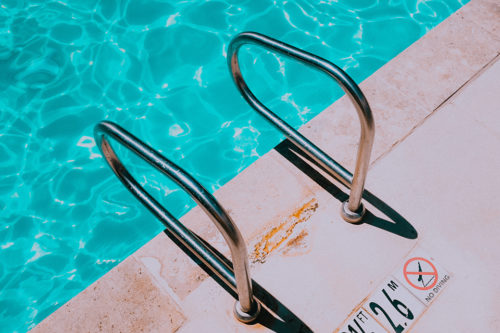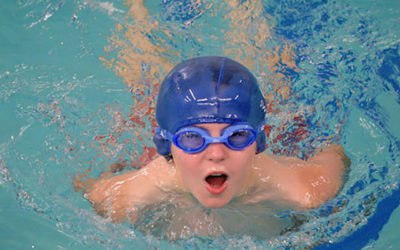Overcoming a fear of water can be hard on the student
Seeing a child afraid is hard on any parent. Seeing that same child suffer from a fear that could turn into a lifelong obstacle – is downright terrifying. Fear of the water, though a normal behavior in many kids, is one that is particularly important to overcome to keep them safe throughout their lives. Drowning prevention starts with learning how to manage fear and anxiety around water and water activities.
According to Psychology Today, two-thirds of Americans are afraid of deep, open bodies of water and 46% are afraid of the deep end of a pool. That same study sites that a staggering 37% of adult Americans are unable to swim at all.
Knowing how to swim and prevent any panic around the water are unquestionably life-saving skills. At SwimWest our primary goal is water safety. Understanding a child’s fear of water is one of the first steps in that goal.
Why is my child fearful of water?
Being afraid of water is not uncommon in young children. Sometimes, a fearful situation can prompt the fear, or it may be something that comes on without any real explanation. A lot of times swimmers who are feeling fearful will talk about how they don’t want to go near the water or even have water on them. When confronted with going in the water they will often cry or try to run away.
How can I help my child get over their fear of water?
Address the fear first. Fear stems from the unknown. Reading to your children about what they might be afraid of may be helpful. They may feel understood when shown other characters who struggle with the same concerns. If you have a child who is scared to get in the water, there are many great children’s books available including:
The Crocodile Who was Afraid of the Water by Rachel Hawthorne
This Makes Me Scared by Courtney Carbone
Froggy Learns to Swim by Jonathan London
What else can I do?
Arm your child with facts, and they’ll not only feel smarter, but that knowledge can help them conquer their fear. Find out what water is made of, how our bodies need it, why ice cubes float, etc. and get into the science of it. Learning about water can be a fun thing to do with your child. The more they know about their “nemesis,” the more likely they’ll be able to cope with their fear.
What do the experts at SwimWest recommend?
Caitlin Steiger, a SwimWest swim instructor, recommends parents establish trust before they even get near the water. “Start lots of conversation about it at home,” she says. “Including talking about how fun swimming is and remaining positive about it.” Creating that dialogue will help your child express what scares them about the water. “Playing in the tub with toys and rain shower buckets is an enormous help,” she said. She recommends getting them to adjust to having a bit of water on their face. “One great game is to count 1,2,3 then slowly pour water over their heads from the back to the front.” Though, she stressed that it should be fun, and they should feel in control and safe. “Let them take it at their own pace.”
When should we put our toe in?
When it comes to swimming lessons, don’t push but don’t take no for an answer either. After all, it is a skill that may save their life and one they will need to say safe. Luckily, SwimWest takes a unique approach by offering year-round lessons in a warm, indoor facility. Classes are always kept small so each child including the fearful ones, get lots of attention. Kids aren’t moved up to the next level until they are ready. The instructors are trained to make it fun. Caitlin says she includes singing songs, playing games and lots of other activities to create a distraction from any water anxiety her students may have.
There’s an appropriate class for every stage and every ability including those with a fear of water. SwimWest offers private and semi-private lessons for children who need extra attention. The team at SwimWest will focus on getting your little one comfortable in the water and developing a lifelong love and not a fear of the water.



